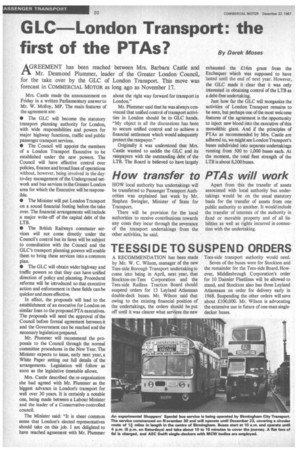G LC—London Transport: the
Page 22

If you've noticed an error in this article please click here to report it so we can fix it.
first of the PTAs? By Derek Moses AGREEMENT has been reached between Mrs. Barbara Castle and Mr. Desmond Plummer, leader of the Greater London Council, for the take over by the GLC of London Transport. This move was forecast in COMMERCIAL MOTOR as long ago as November 17.
Mrs. Castle made the announcement on Friday in a written Parliamentary answer to Mr. W. Molloy, MP. The main features of the agreement are: • The GLC will become the statutory transport planning authority for London, with wide responsibilities and powers for major highway functions, traffic and public passenger transport services.
• The Council will appoint the members of a London Transport Executive to be established under the new powers. The Council will have effective control over policies, finance and broad lines of operations without, however, being involved in the dayto-day management of the Underground network and bus services in the Greater London area for which the Executive will be responsible.
• The Minister will put London Transport on a sound financial footing before the take over. The financial arrangements will include a major write-off of the capital debt of the LTB.
• The British Railways commuter services will not come directly under the Council's control but its fares will be subject to consultation with the Council and the GLC 's transport planning powers will enable them to bring these services into a common plan.
• The GLC will obtain wider highway and traffic powers so that they can have unified direction of policy and planning. Procedural reforms will be introduced so that executive action and enforcement in these fields can be quicker and more effective.
In effect, the proposals will lead to the establishment of an executive for London on similar lines to the proposed PTA executives. The proposals will need the approval of the Council before formal agreement between it and the Government can be reached and the necessary legislation prepared.
Mr. Plummer will recommend the proposals to the Council through the normal committee procedures in the New Year. The Minister expects to issue, early next year, a White Paper setting out full details of the arrangements. Legislation will follow as soon as the legislative timetable allows.
Mrs. Castle described the re-organization she had agreed with Mr. Plummer as the biggest advance in London's transport for well over 30 years. It is certainly a notable one, being made between a Labour Minister and the leader of a Conservative-controlled council.
The Minister said: "It is sheer common sense that London's elected representatives should take on this job. I am delighted to have reached agreement with Mr. Plummer about the right way forward for transport in London."
Mr. Plummer said that he was always convinced that unified control of transport activities in London should be in GLC hands. "My object in all the discussions has been to secure unified control and to achieve a financial settlement which would adequately protect the ratepayer."
Originally it was understood that Mrs. Castle wanted to saddle the GLC and its ratepayers with the outstanding debt of the LTB. The Board is believed to have largely exhausted the £.16m grant from the Exchequer which was supposed to have lasted until the end of next year. However, the GLC made it clear that it was only interested in obtaining control of the LTB as a debt-free undertaking.
Just how far the GLC will reorganize the activities of London Transport remains to be seen, but perhaps one of the most welcome features of the agreement is the opportunity to inject new blood into the executive of this monolithic giant. And if the principles of PTAs as recommended by Mrs. Castle are adhered to, we might see London Transport's buses subdivided into separate undertakings running from 500 to 1,000 buses each. At the moment, the total fleet strength of the LTB is about 8,200 buses.




















































































